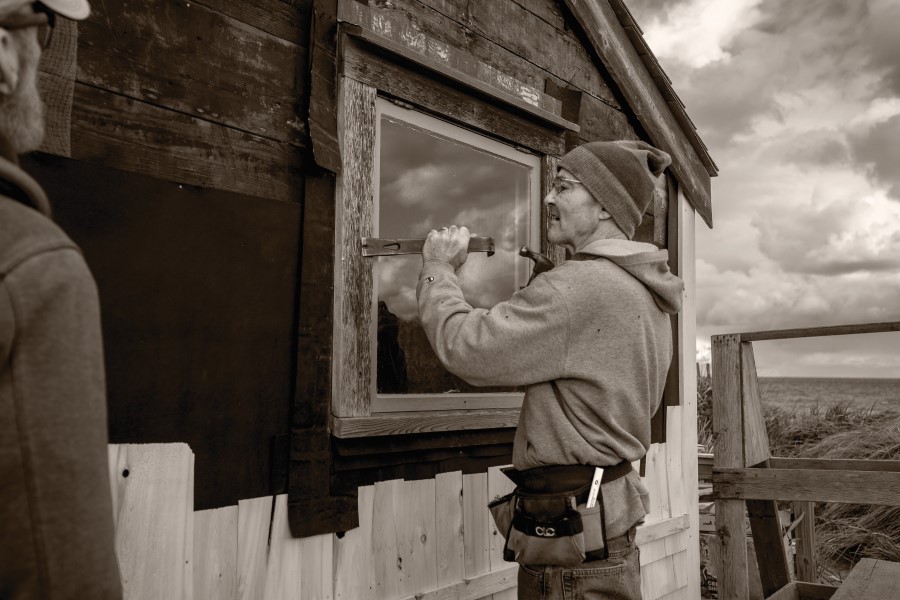
Nat Bull is a master carpenter who learned the trades building custom houses in Chatham and then worked as the shop teacher in Provincetown until the high school graduated its last class in 2013. In recent years, Nat has had a new calling: leading a group of volunteers and a few experienced builders to restore a group of historic dune shacks along the back shore. Here’s Nat in his own words.
I had summered up here throughout my childhood. When I graduated from college in upstate New York, I drifted back to Cape Cod.
[Nat got a job working for a builder whose nickname was Grump.] Grump was an old-style builder. Half the people in town had worked for this guy. Grump was a real task master, a very tough guy, strong guy. Nobody graduated. Everybody quit because nobody was good enough, smart enough, fast enough. One fellow had the record for five years. Another was there for seven. He held the record for a long time. I was there for probably seven years total, but it wasn’t uninterrupted. If you stayed around long enough, you got to be in charge, which is when you really learned the trade.
In 2002-2003 I took the shop teaching position in Provincetown. For me, that was the greatest part of my career. I finally got my chance to teach high school kids. We did just bigger and better, always pushing the envelope, always challenging ’em to do the biggest projects possible. You know, a kid wants to build a boat, we’re gonna build a boat! Motivating them for that sort of thing was not difficult.
We never did get into acoustical guitar building, which is maybe the highest form of wood working, which is kind of a regret for me. But barring that one item, I never said, No. If someone had an idea — you want to build a jewelry box, we can do it. You want to build a hutch that stands six feet tall, we did that as well. The Pier Corporation, they need an 8 by 12 shack, and I said, Let’s do that. We can do that for you. Those shacks are still there.
I think there’s 19 shacks in the dunes. Peaked Hill Trust (a nonprofit) manages five. We’ve saved three of them that looked like they were not going to be around, if they weren’t restored properly. It’s a very harsh environment.
The dunes are shifting constantly. They’re like slow motion waves.
You go by the Mid-Cape Highway, the dunes are so prevalently on display there. That sand is moving onto the highway. They have to go in there with front loaders and take the sand away, because the road could get buried.
One of the teachers at my school was involved with the shacks, and she kept telling me, You’ve got to come. And finally I gave in, and I went. I was taken out to a dune shack one fall afternoon, which was kind of a magical experience. The first time you go to one of those places, you’re out in the middle of nowhere, and you walk inside, and you’re like, Holy mackerel! Isn’t this amazing? You go in there, and there’s a stove and a refrigerator. And there are windows with pulley systems and cables and counterweights. You untie this window, and you lower a weight, and the string moves, and the window comes up! Everything is built with deliberate purpose and design.
Most of the shacks are cobbled together with driftwood and strange pieces of wood. So, as a builder and someone who who’s always been in construction and taught shop class, you go in and go, Wow! These people, who have no talent at all and absolutely no materials, have kept these things standing all these years. So, you get hooked! The dune shacks are not for everybody, but for a certain person, it’s like, Wow! I’m in!
Peaked Hill Trust has what’s called work weekend early in the spring each year. Armies of people go out there and begin doing the tasks of opening up the shacks after the winter. We went out there one fabled work weekend. I happened to bring my carpenter’s toolbox with me because, if I’m going to work, I knew that I have to have my hand tools. And so, I got out there, and at [the shack called] Zaras, the stove pipe had rusted out. I looked at that and thought, I can do that. Somebody came back in, they’re like, Whoa! Who did that? It was easy enough. I happened to be there, and I filled that slot. And I thought to myself, Well, I got a place here if I want it. That’s how it started.
And then we ended up doing all kinds of things. All the privies were timing out because they’d all been built probably 25 years earlier. And we ended up building five total. So, all the privies there are in good shape. That was one of the first big things we did out there.
We’re trying to take care of these shacks and not get behind the eight ball. If they get buried, we have to dig them out, because they’re going to rot if they stay buried. And if they’re left high and dry and standing eight feet above the ground, they become unstable. So, it becomes our job to lower the shack. No matter what it is, if the roof starts to leak, we have to strip the roof. We have to replace the rotten boards. We have to tar paper and reshingle the thing.
You can only patch the shack for so long. People with the best intentions who don’t have carpentry skills are gonna keep the shack going. But my theory was, if we’re gonna do this, let’s do it like carpenters would do it. If we do it right, we won’t have to return.
If something is wrong, you want to keep up with it. But at the same time, you don’t want to change anything. Jody [Melander] said to me, if Hazel Hawthorne returned to her shack from 75 years ago, she would walk up and recognize it. It wouldn’t look different. We struggle to do that. If a window is being rebuilt, you don’t rebuild the entire window. You pull it apart, repair the rotten wood, put it back together the way it was, keep as much of it as is possible original.
Thalassa has the honor of being the closest to the foredune, which is the main dune facing the ocean. And she’s right at the cusp. When you step out of the door at Thalassa, the dune is at nose height. You’re looking over it, and there’s the beach. You are right there.
At Thalassa last year, we knew there was a major upgrade coming. Five years ago, the ocean was creeping closer and closer. And it looked like Thalassa would have to be moved to save it. And then, all of a sudden, the ocean reversed course and started building up. So, we didn’t have to move Thalassa, as it turned out. But we kept thinking, Well, what would happen if we did have to move it, because we couldn’t move it. There was nothing to push against. There was no floor system there. It was really in rough, rough, rough shape.
So, just last winter, we went out with a crew, and we bolted giant modern beams to the side of Thalassa, got four jacks, lifted the shack up, and just disconnected the bottom floor system. The shack comes up, and a crew of hardy volunteers come with saws. We reused all the beautiful lumber that we could possibly reuse from the floor system at Thalassa, and we rebuilt it, pounded the frame together by hand, no plywood, not a stitch of plywood on Thalassa. It’s old style, put together the old way.
I’ve been lucky to get a couple of other builders to come out with me. When you’re in the middle of this construction project, it has to happen [quickly]. You have to move forward with it, because the worst thing imaginable could happen. You could have a storm out there. And if the shack isn’t secure, it could be a disaster, which almost happened this last time. We had Thalassa jacked up. We built the new floor. The storm was coming. It ended up blowing 80 miles an hour. There was a gust in Truro recorded at 90 miles an hour.
We were in the throes of this project. We couldn’t stop. We were kind of caught on our heels, and we had to do this. So, we got the new floor system framed. We got the subfloor nailed down. A bunch of guys were in there pounding. You know, everyone was pounding nails, Bam, Bam, Bam! It’s noisy. And we loosened up the jacks, we set the shack down back on the new floor, but we didn’t fasten it. And just as the rains were starting, everybody scrambled, and we took off. It was like a hurricane that night.
I didn’t worry too much about it, but then the phone started ringing in the morning, and the other guys started to call me, and they’re like, Do you think everything’s okay? What do you think? What do you think? And I go, I think everything’s fine. But then they planted that doubt in my mind!
And so, I had to drive out to P’town. I don’t know whether we waited a day. And as I got closer, I was like, Oh my God, I hope the shack is there! And I’m racing and just like imagining the worst. I was quite frightened. It could have tipped over. I kept thinking, Oh my God, the thing’s gonna roll over. It’s gonna be in a heap down the dune, falling apart.
It was fine! It stayed there, even though it wasn’t nailed down. We dodged a bullet there, I guess.
Thalassa is a special place, and it is beautiful. Well, I think it’s gonna last forever, as long as they keep jacking it up every time it gets buried, which is gonna happen again.
If the ocean began to erode the dune, we’d jack it up and put it on runners and roll it down the dune and move it. It’d be real easy. I got a plan already. If you can move a 300-foot lighthouse, we can move Thalassa!



